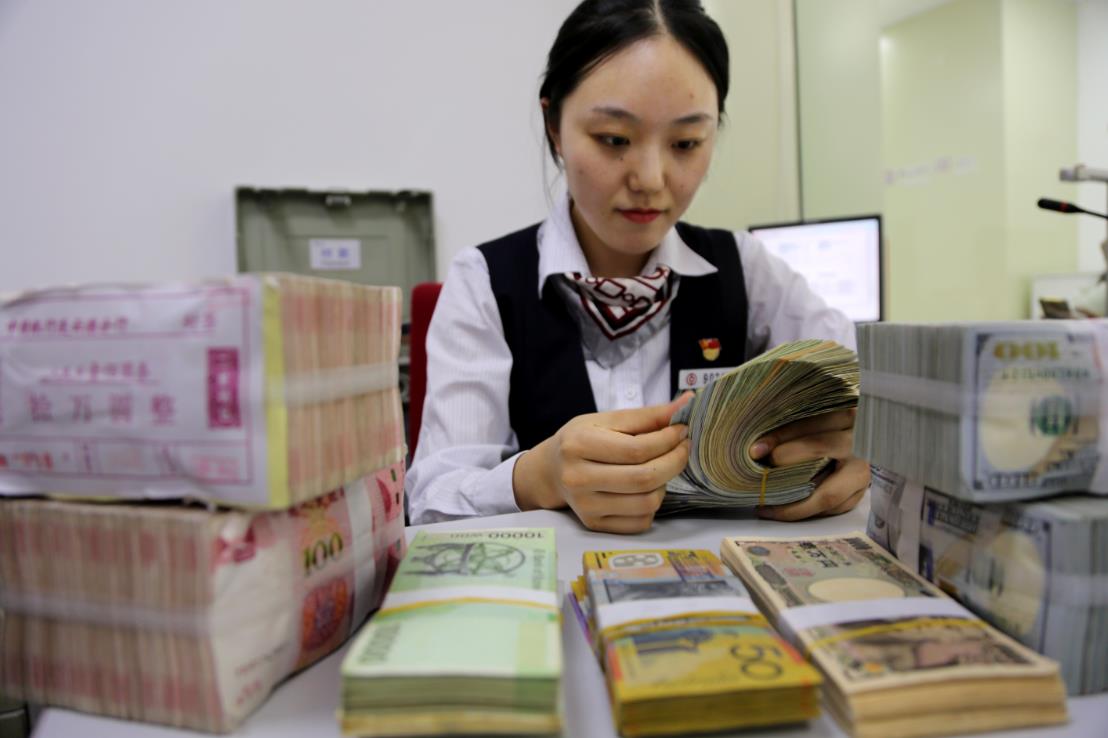Forex market faces new challenges


Zhao said the currency composition of the reserves in China "almost" matches the global trend.
Chen warned that given the large proportion of global reserves held in US dollars, "the US, to some extent, can influence the foreign exchange market through affecting the dollar's value, which could also result in adverse impacts on China amid the escalating trade dispute."
On Aug 5, the US designated China "a currency manipulator". Immediately after the announcement by the US Treasury Department, the dollar and stocks fell sharply and gold strengthened. Fears then rose in global financial markets, triggering increased volatility.
According to economists, forex reserves are usually seen as cushions against drastic fluctuations in foreign exchange rates. The value of the renminbi can be stabilized through selling or buying foreign exchange, and the country's ample reserves can prevent short-term foreign debt risk.
After assessing the situation last year, the IMF concluded in a report that estimates suggested there had been little foreign exchange intervention by the PBOC. The report, issued on Aug 9 in Washington, was quoted by analysts to support China's objection to being labeled a currency manipulator by the US.
"(China's) reserves remain adequate and there were no indications of large-scale foreign exchange intervention despite renminbi depreciation against the US dollar," the report said. "China's foreign currency reserves remain more than adequate to allow a continued transition to a floating exchange rate."
Patience urged
In addition to currency disputes, global investors expect that if the United States Federal Reserve announces more rate cuts in the coming months, it could drive down US dollar-denominated asset prices and weaken the value of most forex reserves.
Yu Yongding, a senior economist at the Chinese Academy of Social Sciences, said the PBOC has suggested allowing a more flexible floating of the renminbi exchange rate, and has continued to push for market-oriented reform of the foreign exchange rate regime.
The central bank should be patient and stick to reform, Yu said, adding that there has been no intervention in the forex market through sales of such reserves for a long time, even though the renminbi may be under depreciation pressure amid global monetary easing.
According to SAFE, the major task for foreign exchange management this year is to enhance midand long-term asset allocation and optimize and adjust investment strategies.
Xie Yaxuan, chief analyst at China Merchants Securities, said there is a global trend where countries with large holdings of reserves tend to focus on long-term and relatively stable investments, such as infrastructure construction, to hedge against potential fluctuations in bond and equity markets.
"A shift toward using domestic currency is another trend," he added.
Profitability is generally accepted by the world's major central banks as the prime objective for reserve management, in addition to safety and liquidity. The emphasis on the return objective has generally increased over time, according to experts.
SAFE said in its annual report that China had achieved a 10-year return rate of 3.68 percent on average on its foreign exchange reserve investments from 2005 to 2014.
Wang Chunying, a spokeswoman for SAFE, said the investment return rate was at a relatively good level compared with those of global peers.
"China's forex reserve currency structure is diversified, even more diversified than the global level on average," Wang said. "It is in line with the requirements of China's economic and trade development, as well as the demand for international payments."
Prospective returns on China's vast foreign exchange reserves are likely to remain stable at more than 3 percent, and the regulator is optimizing investment strategies this year to increase asset values and reduce the adverse impact of foreign exchange rate fluctuations, according to economists.
Zhao, from the China Financial Futures Exchange, said it is also a trend for global monetary authorities, including the PBOC, to increase gold in their reserve portfolios to prepare for any shocks resulting from financial risks and foreign exchange rate fluctuations.
China needs to hold more gold when external uncertainties are increasing, Zhao added.
SAFE said the country's gold reserves rose to $87.27 billion by the end of June, up from $79.32 billion in January. China had the world's sixth-largest gold reserves by the end of last year, with a total of 1,852 metric tons.
In China, official reserve assets cover five items: foreign exchange reserves; gold; IMF reserve position; Special Drawing Rights and other reserves.
The amount and structure of the country's foreign exchange reserves are changing dramatically, along with the global and domestic economic development situations, economists said.




































